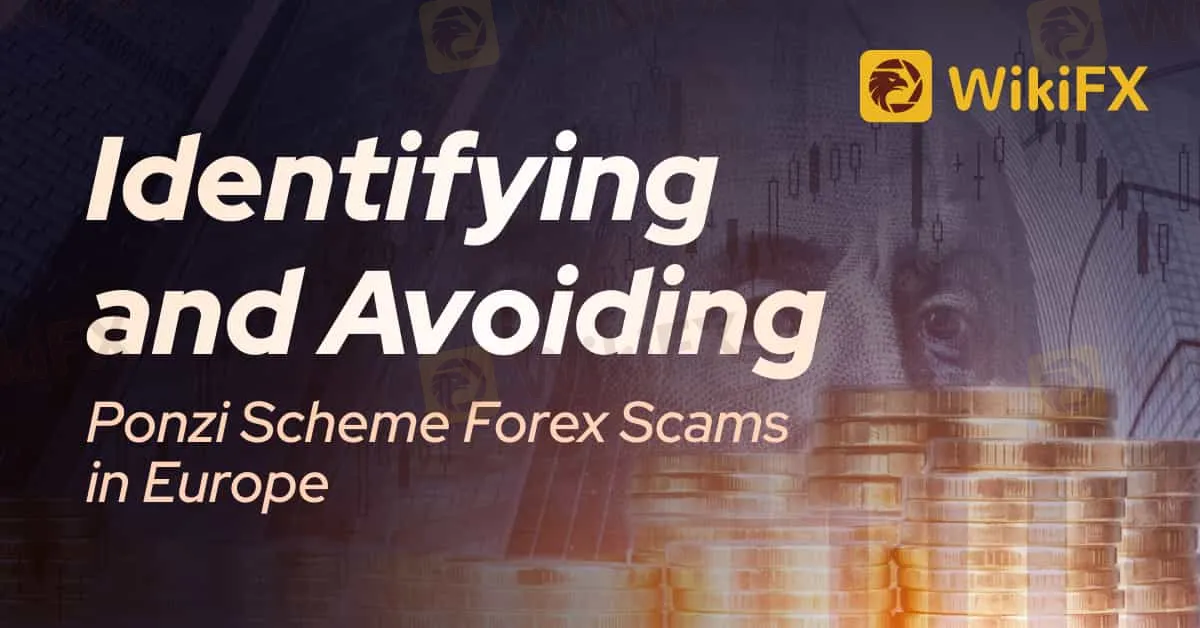简体中文
繁體中文
English
Pусский
日本語
ภาษาไทย
Tiếng Việt
Bahasa Indonesia
Español
हिन्दी
Filippiiniläinen
Français
Deutsch
Português
Türkçe
한국어
العربية
Identifying and Avoiding Ponzi Scheme Forex Scams in Europe
Abstract:Ponzi schemes have been a persistent problem in the financial industry, and forex markets are not exempt from their reach. These scams promise unrealistically high returns, often through forex trading, but instead rely on new investors' funds to pay off older investors. In this article, we will discuss how to identify and avoid Ponzi scheme forex scams in Europe.

Ponzi schemes have been a persistent problem in the financial industry, and forex markets are not exempt from their reach. These scams promise unrealistically high returns, often through forex trading, but instead rely on new investors' funds to pay off older investors. In this article, we will discuss how to identify and avoid Ponzi scheme forex scams in Europe.
Unrealistic Promises
Ponzi schemes lure victims with promises of extraordinary returns on investments. Be cautious of any scheme that guarantees high, consistent profits with little to no risk. Remember, if it sounds too good to be true, it probably is.
Lack of Transparency
Ponzi schemes often lack transparency when it comes to sharing information about their trading strategies or the specifics of their investments. Legitimate forex trading firms provide transparent information about their strategies and investments, while Ponzi schemes rely on secrecy and vague explanations.
Pressure to Recruit
Ponzi schemes typically encourage participants to recruit others to join the scheme. This is done to sustain the flow of new investments, as the funds from new recruits are used to pay off older investors. If a scheme emphasizes recruitment over actual trading, it's likely a Ponzi scheme.
Verified Track Record
Legitimate forex firms can provide verifiable records of their trading history, demonstrating consistent returns over time. In contrast, Ponzi schemes often fail to provide audited records or any evidence of their trading activities. Request proof of trading performance before investing.
Conclusion
Protecting yourself from Ponzi scheme forex scams in Europe requires vigilance and skepticism. Avoid schemes that promise unrealistic returns, lack transparency, or emphasize recruitment over trading. If you suspect a scheme may be a Ponzi scheme, report it to the appropriate authorities immediately. For more information on forex scams and reliable resources, visit WikiFX at www.wikifx.com. They offer valuable insights and tools to help traders make informed decisions and avoid falling victim to fraudulent schemes.

Disclaimer:
The views in this article only represent the author's personal views, and do not constitute investment advice on this platform. This platform does not guarantee the accuracy, completeness and timeliness of the information in the article, and will not be liable for any loss caused by the use of or reliance on the information in the article.
Read more

TriumphFX Rebrands to Continue Global Fraud: Over RM80 Million Lost
The notorious forex investment company TriumphFX, previously exposed for running a global scam operation for over a decade, is now being accused of rebranding itself to continue defrauding unsuspecting investors. Despite being unregulated and based offshore in Seychelles, TriumphFX has actively targeted Malaysian investors, luring them with false promises and eventually converting funds into cryptocurrency, making recovery nearly impossible.

TriumphFX Faces 29 Exposure Reviews on WikiFX
TriumphFX faces scrutiny with 29 exposure reviews on WikiFX, revealing regulatory warnings from ID BAPPEBTI, VU VFSC, SG MAS, and MY SCM, plus user complaints about withdrawal issues and fraud concerns.

What WikiFX Found When It Looked Into Exclusive Markets
In the fast-growing world of online trading, security and regulation are essential. One company now raising questions in this space is Exclusive Markets, a broker claiming to be regulated, but scrutiny of its licence and operations suggests a more complex picture.

TriumphFX Review 2025: A Safe Bet or a Risky Trap?
Is TriumphFX a trustworthy broker or a scam in 2025? This review explores its regulation, withdrawal issues, and more to help you decide if it's a safe bet or a risky trap.
WikiFX Broker
Latest News
SkyLine Guide 2025 Malaysia: 100 Esteemed Judges Successfully Assembled
Vantage Markets Review 2025: Trusted Forex and CFD Trading Since 2009
Why STARTRADER Is Popular Among Traders?
A Guide to Intraday Forex Trading You Can't Miss Out
CONSOB Blocks Access to 13 Unauthorized Investment Websites
TradingPRO: A Closer Look at Its Licences
The world could be facing another ‘China shock,’ but it comes with a silver-lining
New SEBI Regulations on Intraday Trading
Everything You need to know about Barath Trade
IronFX Broker Review 2025: A Comprehensive Analysis of Trustworthiness and Performance
Currency Calculator


